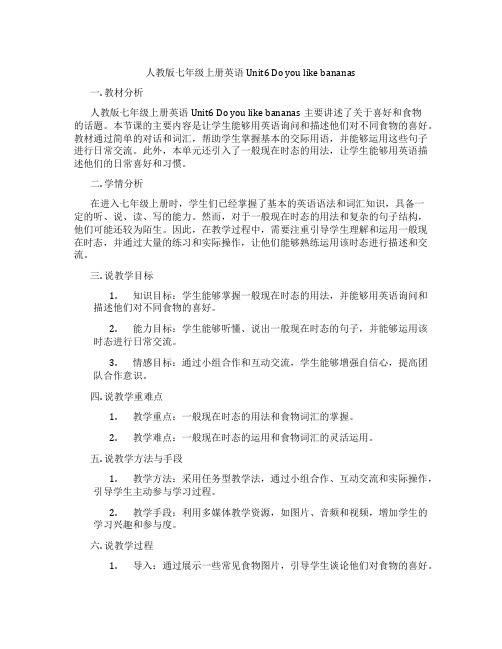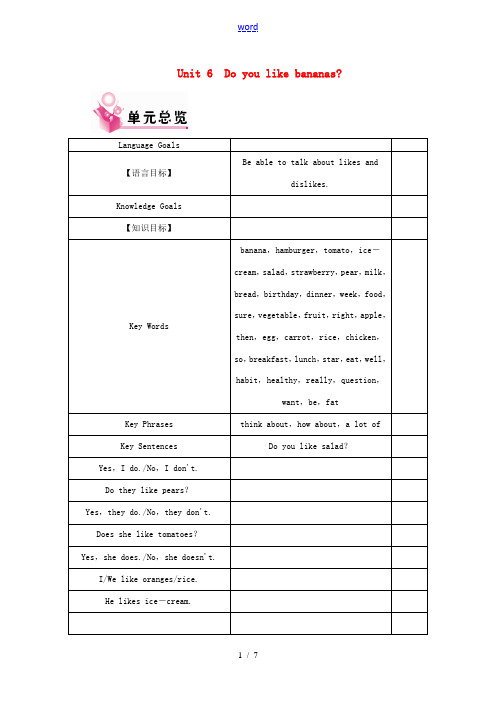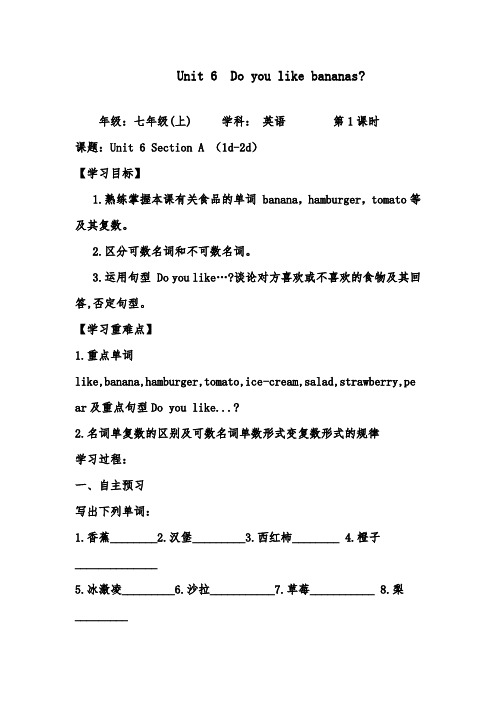2019年七年级英语上册Unit6DoyoulikebananasSectionA备课资料新版人教新目标版_
2019秋七年级英语上册Unit6DoyoulikebananasSectionB(1a_

Do you like French fries?
breakfast
lunch
dinner
I have a hamburger for breakfast.
I have rice and carrots for lunch.
I have an apple and ice cream for dinner
Tom carrots salad
apples
Sally salad
bananas
oranges ice-cream
vegetables
Ask and answer questions about what Sally and Tom 1e like and don’t like.
Does Tom like carrots?
vegetables: __ca_r_r_o_t____t_o_m_a_t_o_e_s___p__o_ta_t_o_e_s_ __o_n_i_o_n______b_r_o_c_c_o_l_i ____________
1c Listen and circle the food you hear in 1a.
教学课件
英语 七年级上册 人教版
Unit 6 Do you like bananas?
Section B 1a-1e
Food order
A: I like…Do you like …? B: Yes, I do. I like…\
No, I don’t. I don’t like …
Pair work
1. orange 2. salad 3. eggs 4. apple
5. ice-cream 6. hamburgcken 9. rice
人教版七年级上册英语Unit6Doyoulikebananas

人教版七年级上册英语Unit6 Do you like bananas一. 教材分析人教版七年级上册英语Unit6 Do you like bananas主要讲述了关于喜好和食物的话题。
本节课的主要内容是让学生能够用英语询问和描述他们对不同食物的喜好。
教材通过简单的对话和词汇,帮助学生掌握基本的交际用语,并能够运用这些句子进行日常交流。
此外,本单元还引入了一般现在时态的用法,让学生能够用英语描述他们的日常喜好和习惯。
二. 学情分析在进入七年级上册时,学生们已经掌握了基本的英语语法和词汇知识,具备一定的听、说、读、写的能力。
然而,对于一般现在时态的用法和复杂的句子结构,他们可能还较为陌生。
因此,在教学过程中,需要注重引导学生理解和运用一般现在时态,并通过大量的练习和实际操作,让他们能够熟练运用该时态进行描述和交流。
三. 说教学目标1.知识目标:学生能够掌握一般现在时态的用法,并能够用英语询问和描述他们对不同食物的喜好。
2.能力目标:学生能够听懂、说出一般现在时态的句子,并能够运用该时态进行日常交流。
3.情感目标:通过小组合作和互动交流,学生能够增强自信心,提高团队合作意识。
四. 说教学重难点1.教学重点:一般现在时态的用法和食物词汇的掌握。
2.教学难点:一般现在时态的运用和食物词汇的灵活运用。
五. 说教学方法与手段1.教学方法:采用任务型教学法,通过小组合作、互动交流和实际操作,引导学生主动参与学习过程。
2.教学手段:利用多媒体教学资源,如图片、音频和视频,增加学生的学习兴趣和参与度。
六. 说教学过程1.导入:通过展示一些常见食物图片,引导学生谈论他们对食物的喜好。
2.新课呈现:引入一般现在时态的概念,并通过示例句子让学生理解一般现在时态的用法。
3.对话练习:让学生听录音或观看视频,模仿对话中的句子,并进行角色扮演。
4.小组活动:学生分组进行讨论,用英语询问和描述他们对食物的喜好。
5.巩固练习:通过完成练习题和互动游戏,让学生进一步巩固一般现在时态的用法。
2018-2019学年七年级英语上册 Unit 6 Do you like bananas Sect

Unit 6 Do you like bananasSection A (3a—3c)Ⅰ.词汇(A)写出下列名词的复数形式。
1.banana __________ 2.tomato __________3.photo __________ 4.orange __________5.strawberry __________(B)写出下列动词的第三人称单数形式。
1.have__________ 2.watch __________3.play __________ 4.eat __________5.like __________Ⅱ.根据句意及汉语提示完成句子1.I don't like ________ (鸡蛋). What about you?2.I have ________ (鸡肉) for dinner.3.Eddie doesn't like ________ (胡萝卜).4.—Do you like________ (米饭)?—Yes, I do.5.She likes fruit. ________ (那么), let's eat some apples. Ⅲ.用括号内所给单词的适当形式填空1.We often have some ________ (carrot) and milk.2.She likes vegetables, but she ________ (not like) salad. 3.Tom and I like ________(tomato).How about you?4.My grandpa ________(have) some milk every day.5.These ________ (orange) cups look nice.6.________ (do) they like pears?7.Does he like ________ (strawberry)?8.Lily has some ________ (bread) every morning.Ⅳ.单项填空( )1.He likes hamburgers, but he________eggs.A.don't like B.likesC.doesn't like D.isn't like( )2.I often eat some vegetables, like(像)________.A.strawberries B.eggsC.tomatoes D.hamburgers( )3.—Let's________ icecream.—I don't like ________.A.have; it B.to have; itC.to eat; it D.eat; they( )4.Mike likes ________ and I like ________.A.breads; chickens B.salad; chickenC.breads; chicken D.salad; chickens( )5.I don't like vegetables, ________ I like fruit. A.and B.soC.but D.forⅤ.根据汉语意思完成句子,每空一词1.迈克喜欢水果,他不喜欢汉堡包。
七年级英语上册unit6doyoulikebananas

早饭/午饭/晚饭我喜欢…… 3. I don’t like … for breakfast/lunch/dinner. 早饭
/午饭/晚饭我不喜欢……
2021/12/13
第十六页,共三十六页。
4. He/She likes …, but he/she doesn’t like ….
他/她喜欢……,但他/她不喜欢…… 5. For breakfast/ lunch /dinner, he/she likes/
hamburgers and salad, but he doesn’t like
2021/12/13
第十八页,共三十六页。
_c_h_ic_k_e_n__. And for dinner, ___h_e_l_ik_e_s_b_a_n_a_n_a_s _a_n_d__b_r_e_a_d_,_b__u_t_h_e__d_o_e_s_n_’_t_l_ik_e__s_tr_a_w__b_e_r_r_ies.
2021/12/13
第四页,共三十六页。
Words challenge
strawberry
banana
pear
2021/12/13
第五页,共三十六页。
tomato
carrot
potato
egg 2021/12/13
第六页,共三十六页。
rice
Warming up and leading in.
2021/12/13
第十页,共三十六页。
3a Complete the survey for
you and your partner.
秋七年级英语上册 Unit 6 Do you like bananas Period 1 Secti

Unit 6 Do you like bananas?Language Goals【语言目标】Be able to talk about likes anddislikes. Knowledge Goals【知识目标】Key Wordsbanana,hamburger,tomato,ice-cream,salad,strawberry,pear,milk,bread,birthday,dinner,week,food,sure,vegetable,fruit,right,apple,then,egg,carrot,rice,chicken,so,breakfast,lunch,star,eat,well,habit,healthy,really,question,want,be,fatKey Phrases think about,how about,a lot ofKey Sentences Do you like salad?Yes,I do./No,I don't.Do they like pears?Yes,they do./No,they don't.Does she like tomatoes?Yes,she does./No,she doesn't.I/We like oranges/rice.He likes ice-cream.Key Grammar The simple present tense Nouns:countable nouns anduncountable nounsAbility GoalsBe able to municate with classmates 【能力目标】about likes and dislikes.Moral GoalsHelp students to have a healthy 【情感目标】eating habit.Teaching Time【课时】Four periodsPeriod 1 Section A(1a~1c)Period 2 Section A(2a~3c)Period 3 Section B(1a~1e)Period 4 Section B(2a~Self Check)Period 1 Section A (1a~1c)Teaching important points【教学重点】1.Key words & phrases:banana,hamburger,tomato,ice-cream,salad,strawberry,pear,milk,bread2.Key sentences:Do you like bananas?Yes,I do.Do you like salad?No,I don't.Teaching difficult points【教学难点】Be able to ask and answer questions about likes and dislikes.Teaching aids【教具】a tape player,CAI,pictures,fruitsTeaching procedures and ways【教学过程及方法】★Step Ⅰ Revision and lead-in复习导入Show students a picture of a supermarket and ask them:T:What's this?Ss:It's a picture.T:Good,can you guess what kind of place it is?Ss:A shop/market…T:Do you often go shopping?Ss:Yes.T:And what do you buy?Ss:Clothes,books…T:Wonderful.Today,let's learn more food we usually buy in the supermarket. ★Step Ⅱ Self-studying and guiding自学指导Self-study 1:Self-study the new words:banana,hamburger,tomato,ice-cream,salad,strawberry,pear,milk,bread.Learn to pronounce them according to the phonetic symbols.You can listen to the tapes to help you pronounce them correctly or ask others for help.Self-study 2:Read the conversations in Part 1a by yourselves and match the words with the things in the pictures.Questions for thinking:(1)Write down the plural forms of the words.tomato____________________strawberrybananapear______________________(2)Do you like tomatoes?Yes,________ ________.No,________ ________.The teacher walks around the classroom to watch and help the students study while the students are self-studying.Encourage students to find out their problems in self-studying both in pronunciation and understanding.Time for questions:Discuss the difficulties that most students have and explain the language points that most students can't understand.★Step Ⅲ Check up检查核对Check up 1:Words teaching:Ask a few students to read the new words and help them correct the mistakes in pronunciation if necessary.Check up 2:Check the answers to exercises on Page 31 and above.Check up 3:Ask a few students questions with the target language to see if they can respond correctly.Sample dialog:T:Do you like milk?S1:Yes,I do.T:Do you like strawberries?S2:Yes,I do.T:Do you like oranges?S3:No,I don't.…★Step Ⅳ Cooperative inquiry合作探究1.Listening (1b)Listen to 1b carefully and number the conversations[1-3].Listen again,repeat the conversations sentence by sentence.2.Pair work:Work with your partner and role-read the conversations in Part 1b.And then make your own conversations using the things in the picture.3.Role-play:Ask some pairs of students to act out their conversations in front of the class.★Step Ⅴ Practice练习1.Speak out the words as quickly as possible with pictures prompt,pay attention to the plural forms of countable nouns.2.选词填空。
新目标英语七年级(上)Unit 6 Do you like bananas?难点剖析

Hes de n lh w l t i E gi e1 u s s .
一
我喜 欢 这张光 盘 , 它非 常好 。
他英 语学 得好 。 你身 体 怎么样 ?
H w aey u o r o ?
难 点剖 析 l 11 10 2. 0
新目 标英语七年级( U i 上) n t D o k bnns难点 oyule aaa i ? 剖析
重 点 词 汇
l e 欢 ;b n n i 喜 k aa a香蕉 ;t t 红柿 ;oa g 橙 子 ;柑橘 ;i ra 冰 淇淋 ;sld沙拉 ; o o西 ma rn e c cem e a a hv ae吃 , ;fo 饮 o d食 物 ;c ik n鸡 , 肉 ;bekat hc e 鸡 rafs 早餐 ;ln h午 餐 ;dn e 正 餐 , uc inr 晚餐 ;f i水 rt u 果 ;vg t l 蔬 菜 ;h aty 康 的 ;l t eea e b el 健 h i 清单 s
我们 口渴时就 喝点 水 。
她 常常下 午六 点 吃晚饭 。
go od与 w l的 区别 el
go od和 w l都是 “ ” el 好 的意思 , 它们 的词 性有 区别 , 但 用法 也不 相 同 。 od是 形容 词 , go 用来修 饰名
词, 表示 人 或事 物 的性 质 、 征 和状 态 ; e 是 副 词 , 特 wl l 用来 修 饰行 为动 词 、形 容词 、其 他 副词 或 整个 句 子 。 当 w l表 示 “ el 身体好 ” 时为形 容词 , b 与 e动词 连用 。例如 :
-
I I vr el h n o . ’I ey w l ak yu T ,t
人教新目标版七年级英语上册Unit6Doyoulikebananas教案-2019

人教新目标版七年级英语上册Unit6Doyoulikebananas教案-2019The First PeriodSection A (1a-2d)Ⅰ.Teaching aims:1.Knowledge aims:(1)Keywords:banana,hamburger,tomato,ice-cream,salad,strawberry,pear,milk,brea d,birthday,dinner,week,food,sure,vegetable,fruit,right,apple,then(2)Key phrases:birthday dinner,next week,think about,how about,what about(3)Important sentences:①—Do you like salad?—No,I don’t.②—Do you like bananas?—Yes,I do.③Let’s think about the food.④How about burgers,vegetable salad,and some fruit?⑤What about the fruit?2.Ability aims:Talk about likes and dislikes.3.Emotion aims:Make students interested in all kinds of delicious food. II.Important points:Learn about different foods and spell them.III.Difficult points:Remember some important sentences such as “How about...?”.IV.Teaching processStep 1 Warming up1.Show students a picture of different kinds of food.First,let students say some words that theyknew before.Second,teach them some new words.2.Teacher asks one student:—Do you like...?—Yes,I do./No,I don’t.3.Let students practice this dialogue in pairs.Step 2 Work on 1a1.Match the words with the things in the picture.2.Check the answers.3.Game time!(教师用PPT将实物逐个展示出来,同学们快速说出它是什么,第一个说出来的同学得一分)Step 3 ListeningWork on 1b.1.Play the recording for students and let them number the pictures.2.Check the answers.Work on 2a,2b.1.Read the words three times by themselves.2.Listen and circle the food they hear.Check the answers.3.Listen again and try to fill in the blanks in 2b.4.Practice the dialogues in pairs.Step 4 PairworkWork on 1c.Practice the conversations with your partner.Choose some pairs to act them out.Work on 2c.Step 5 Role-play the conversationWork on 2d.1.Let students read the conversation for the first time.Underline some key phrases.2.Talk about the language points.3.Read the conversation again and answer the following questions:(1)What does John like?(2)What fruit does John like?(3)Does John like hamburgers?Language points1.food食品;食物通常情况下作不可数名词。
2019秋七年级英语上册Unit6DoyoulikebananasSectionB1a_1e教

Unit 6 Do you like bananas?Period 3Section B( 1a–1e)【教学目标】●知识目标1. Master the new words and useful expressions.2. Master some useful sentence structures.●能力目标Get students able to talk about likes and dislikes.●情感目标Try to find out suitable learning methods and know how to do things in the right way.【教学重难点】●重点1. Master the new words and useful expressions.Words and expressions: eat, breakfast, lunch.2. Master some useful sentence structures.(1) Tom likes/eats carrots for lunch.(2) Sally likes/eats eggs for breakfast.●难点Understand the differences between the countable nouns and uncountable nouns. 【教学准备】A tape recorder, a projector and handouts.【教学方法】任务型教学法、情景交际法、自主学习与合作学习相结合【课时安排】One period【教学过程】Step 1: Warm-up1. Greet students as usual and check the homework.2. Review what we have learned in the last period.3. Review the grammar.Step 2: Presentation1. Teach activity 1a(1) Ask students to read the words in the box and try to recite them.(2) Point to the three words on the screen and write the number of each word next to the correct words.(3) Invite some students to tell their answers.(4) Check the correct answers with the class.2. Teach activity 1b(1) Lead students to read the instructions and make sure they know what to do.(2) Students add to the lists.(3) Invite some students to tell their answers and some other students to makea complement.(4) Ask students to read those words and recite them.Step 3: Practice1. Teach activity 1c(1) Ask students to listen and circle the food they hear in 1a.(2) Check the correct answers with students.(3) Ask students to work with their partners and practice the listeningmaterial.2. Teach activity 1d(1) Ask students to listen again and fill in the chart in 1d.(2) Play the recording and students fill in the chart.(3) Invite some students to tell their answers.(4) Check the correct answers.Step 4: ConsolidationTeach activity 1e(1) Ask students to work with their partners and make their own conversations.(2) Give students an example.A: Does Tom like carrots?B: Yes, he does.(3) Students ask and answer questions about what Sally and Tom like and don't like. Move around and check the progress.(4) Invite some partners to act out their conversation.【课堂小结】In this period, we’ve consolidated the countable nouns and uncountable nouns. And we’ve also improved our listening skill through some listening practice.【课后作业】Write about what you and your family like for breakfast, lunch, and dinner.。
七年级英语上册 6 Do you like bananas Sectio

币仍仅州斤爪反市希望学校Unit6 Do you likebananas一.英汉互译1.think about ___________2. 健康的食品 __________3. ice-cream ________4. 吃早餐 _________5. for lunch __________6. 生日晚宴__________7. three bananas __________ 8. 体育明星 _________ 9. 一个橙子 ________10. 怎么样_________二. 根据首字母或汉语意思或正确形式填空1.I would like two bottles of _______ and four boxes of ______.(orange)2.There are only two _______ (房间) in my house ; there is no _____ for him to live in.3.I want ________ (eat) chicken for dinner.4.The girls like ______ (蔬菜) and fruit.5.Liu Xiang is a running _______ (明星).6.I don’t want to be ______ (变胖).7.My father’s ________ (生日) dinner is next week.8.Do you eat fruit after _______ (晚饭)?9.Do you like ________ (tomato).10.His sister eats lots of h________ food.11.My sister and I like p_______ tennis三.单项选择:1.She wants to ___________ some eggs.A.eatB.drinkC.doD.go2.He would like _______ some tea.A.to eatB.to drinkC.haveD.drink3.He _____ to _____ these things to school.A.let;takeB.wants;haveC.wants;bringD.lets;take4.I have a cat. It likes fish. It eats _______ every day.A. a lotB. manyC. Lots ofD. a lot of5.–Does your English teacher sing very _____ ? --Yes, She does.A. goodB. niceC. greatD. well6. My friend Li Lei likes salad, but I do n’t like _____ at all.A.itB. themC. itsD. they7. For _____ lunch, she has some hamburgers.A. aB. anC. theD. /8.“What ___ I do for you?〞“I’d like a cup of coffee.〞\A. canB. amC. doD. does9.Tommy likes milk, _____ for breakfast.A.egg and tomatoB. egg and tomatosC. eggs and tomatoesD. eggs and tomatos10.Tony and Tom ____ fruit. But Tony ____ like vegetables.A. likes; don’tB. like; doesn’tC. likes; doesn’tD. like; don’t11._____ your mother ____ orange?A. Do; haveB. Is; eatC. Does; haveD. Are; eat12.Our friend _____ like salad.A. don’tB. doesn’tC. isn’tD. aren’t13.–Do they like hamburgers? –Yes, they like __ very much.A. itB. themC. usD. her14.My sister likes English ______.A. a lot ofB. lotC. lots ofD. a lot15.--_____ you and your brother like sports?--Yes, we _____.A. Are, areB. Does, doC. Does, doesD. Do, do16.—Do they like oranges? --No, they _____.A. doB. does notC. doesD. don’t17. Lucy ______ computer games.A. i sn’t likeB. don’t likeC. doesn’t likeD. not like18. This is a ____. A. orange B. oranges C. banana D. bananas19.It’s time for lunch. _____ us go to the dining room.A. LetB. ShallC. What aboutD. Let’s20. These are five ____ of _____.A. kilo, tomatoB.kilos, tomatosC. kilo, tomatoesD. kilos, tomatoes四.完型填空:Today is my birthday. I _1__ thirteen. Mom and Dad get a cake _2__ me. I _3__ it very much. It’s _4___ the table now. There is some other _5__ like apples, chicken, _6__ and vegetables. _7__ I like chicken best. What about __8__ mother? She _9__ hamburgers. Today we’ll have lots of _10__ for supper.1.A. is B. are C. am D. be2. A. in B. at C. for D. to3. A. thank B. doesn’t like C. likes D. like4. A. on B. for C. in D. at5. A. dessert B. food C. vegetables D. fruits6.A.desks B. pens C. salad D. bikes7. A. Because B. If C. So D. But8.A. his B. my C. her D. our9.A. like B. likes C. does D. do10. A. chickens B. salads C. eggs D. breads五.阅读理解判断正误T\FI have a good friend, Tom. He is a nice boy, but he eats too much (太多) and he doesn’t like sports.He has a big breakfast every morning. He has four eggs, some bread and milk. For lunch, he eats two hamburgers, lots of French fries and chicken. He has much Coke(可乐) , too. For dinner , he likes beef (牛肉) and salad. He likes ice cream, Coke, hamburgers and dessert.Too much food is not good for Tom. And he is not healthy.1.Tom eats lots of food and he plays sports every day.2.Tom eats eggs, bread and milk for breakfast.3.Tom likes hamburgers.4.Tom has lots of vegetables and fruits.5.Tom eats too much food. He isn’t healthy.六:连词成句1. We eat can in vegetables and fruits the some morning.__________________________________________________________2.I that in have Can themorning_____________________________________________________3. Mum we says can eat not too things sports much after____________________________________________________________4. Water good is you.. for_____________________________________________________________5.is Dinner big the meal day. of the____________________________________________________________6.My uncle likes hamburgers. (改否认句)_________________________________________7.My good friend likes apples and oranges. 〔一般疑问句〕1._________________________________________8.I like some nice pictures. (否认句)________________________________________________9.They like some carrots. 〔一般疑问句〕______________________________10. I like fruit.(划线提问) _________________________________。
2019年人教版新课标英语七年级上册Unit 6 Do you like bananas

Unit 6 Do you like bananas?年级:七年级(上) 学科:英语第1课时课题:Unit 6 Section A (1d-2d)【学习目标】1.熟练掌握本课有关食品的单词 banana,hamburger,tomato等及其复数。
2.区分可数名词和不可数名词。
3.运用句型 Do you like…?谈论对方喜欢或不喜欢的食物及其回答,否定句型。
【学习重难点】1.重点单词like,banana,hamburger,tomato,ice-cream,salad,strawberry,pe ar及重点句型Do you like...?2.名词单复数的区别及可数名词单数形式变复数形式的规律学习过程:一、自主预习写出下列单词:1.香蕉________2.汉堡_________3.西红柿________4.橙子______________5.冰激凌_________6.沙拉___________7.草莓___________8.梨_________二、合作探究1. Match (1a) 将单词与图中物品配对。
2. Listening (1b)3. Dialog (1c) 练习1b对话,观看幻灯片,然后与伴编新对话。
4. Listening ( 2a, 2b )听录音,完成相应的题目。
三、当堂检测(一)写出下可数名词的复数形式。
1.star 3. watch 4. photo5.backpack6.tomato7.key8. bus 9.strawberry10.dictionary 11.wife_________12.sheep____________ 13.hero____________14.Chinese___________________(二)用所给单词的正确形式填空。
1. There are four _________ ( tomato) in the drawer.2. Jeff likes ____________( strawberry ) very much.3. Are these ____________( you) oranges.4. I______________ (not like ) math.(三)单项选择。
(优选)2019七年级英语上册Unit6DoyoulikebananasSectionB

Unit 6 Do you like bananas?Section B &Self-check1.breakfast/’brekfəst/ n.早餐,三餐饭前不加冠词。
eg:have breakfast吃早饭have lunch 吃午饭have supper吃晚饭但在三餐之前有修饰词时,可以加冠词。
We have a big lunch.我们吃了一顿丰盛的午餐。
He has his breakfast quickly.他快速吃完早饭。
2.lunch/lʌntʃ/ n.午餐What do you like to have for lunch?你午餐喜欢吃什么?拓展:for lunch午餐,at lunch在午餐时,have lunch吃午餐,before lunch午餐前,after lunch 午餐后。
3.Sports StarEats Well!运动明星吃得好!(1)eat/i:t/ v.吃She only eats some bread for breakfast.她早餐只是吃了一些面包。
What does Gina like to eat? 吉娜喜欢吃什么?辨析:have,eat与drink动词have表示“吃、喝”,在英国多用have代替drink,在美国常用eat代替have,而与三餐词汇连用时多用have。
eat流行于美国,多指“吃”,表示“喝”时通常用于喝汤类食物。
drink习惯上用于“喝”水、茶、奶、咖啡等饮料,没有“吃”的含义。
eg: What do you have for lunch? 你午餐吃了什么?Does she like to eat hamburgers? 她喜欢汉堡包吗?Let’s drink some coffee.让我们喝一些咖啡吧。
(2)well/wel/ adv.好,令人满意地eg:Lu cy sings well.露西唱歌唱得好。
拓展:well adj.意为“身体好的;健康的”。
- 1、下载文档前请自行甄别文档内容的完整性,平台不提供额外的编辑、内容补充、找答案等附加服务。
- 2、"仅部分预览"的文档,不可在线预览部分如存在完整性等问题,可反馈申请退款(可完整预览的文档不适用该条件!)。
- 3、如文档侵犯您的权益,请联系客服反馈,我们会尽快为您处理(人工客服工作时间:9:00-18:30)。
Unit 6 Do you like bananas?
Section A
1.hamburger/ˈhæmbɜː(r)ɡə(r)/ n.汉堡包
eg:I need a hamburg er.我需要一个汉堡包。
Do you like hamburgers for breakfast?你早餐喜欢吃汉堡包吗?
【链接中考】 1.I have a for breakfast every day.
A.hot dog
B.cookie
C.dumpling
D.hamburger
2.tom ato/təˈmɑːtəʊ/ n.西红柿
其复数形式是tomatoes。
eg:Do you like tomatoes?你喜欢西红柿吗?
3.salad/ˈsæləd / n. 沙拉
eg: I like salad.我喜爱沙拉。
Do you need some salad? 你需要来一些沙拉吗?
拓展salad 通常用作不可数名词,而salads指“各种各样的沙拉”。
4.strawberry/ˈstrɔːberI/n.草莓
eg: This is a fresh strawberry.这是一颗新鲜的草莓。
Do you like strawberries? 你喜欢草莓吗?
k/mɪlk/n.牛奶
milk是不可数名词,不可以说a milk,但可以表达为some milk。
一杯牛奶表达为“a
cup/glass of milk”。
eg:Do you like milk?你喜欢牛奶吗?
6.bread/bred/n.面包
bread是不可数名词,一片面包应表达为“a piece of bread”。
7.Hey,John‘s birthday dinner is next wee k.嘿,下周是约翰的生日晚宴。
(1)dinner /’dɪnə(r)/n.晚餐;正餐eg:Does she have dinner?她吃晚餐了吗?
(2)John‘s birthday约翰的生日
eg:When is John‘s birthday?约翰的生日是什么时候?
8.How about burgers,vegetable salad,and some fruit?来点汉堡包、蔬菜沙拉和一些水果怎么样?
使用语境:“How about...?”相当于“What about...?”,常用来向对方征询意见。
意为“……怎么样?”。
eg:—I don‘t like pears.我不喜欢梨。
—How about bananas?香蕉怎么样?
拓展:“How about...?”后跟名词或代词;若跟动词,则用动名词形式。
eg:How about watching TV after dinner?晚饭后看电视怎么样?
(1)vegetable/’vedʒtəbl/n.蔬菜
eg:He has some vegetables for dinner.他晚餐吃了一些蔬菜。
拓展:vegetable常用复数,其复数形式为vegetables。
vegetable salad蔬菜沙拉。
(2)fruit/fruːt/n.水果
eg:Do you need fruit?你需要水果吗?
What fruit does she like?她喜欢什么水果?
拓展:fruit 通常用作不可数名词,而fruits指“各种各样的水果”。
(易混点)
9.egg /eɡ/n.蛋;鸡蛋
eg:She likes eggs.她喜欢吃鸡蛋。
Here is an egg for you.这儿有一个鸡蛋,是给你的。
10.apple/’æpl/ n.苹果
eg:Do you like apples? 你喜欢苹果吗?
Let‘s have an apple.让我们吃一个苹果吧。
11.chicken/’tʃɪkɪn/ n.鸡肉,不可数名词。
eg:I like eating chicken and fish.我喜欢吃鸡肉和鱼肉。
拓展:chicken意为“鸡”时,是可数名词。
eg:I am excited when I see many chickens on the farm.当我看到农场里有许多鸡时,我感到兴奋。
例1 “Would you like some?”“No,thank you.I‘m not hungry(饥饿)at all.”(2010,湖州)
A.water
B.books
C.clothes
D.bread
解析:根据题意可知是饿了,所以选bread。
答案:D
例2 —It‘s a fine day today.How about?
—Sound s great!(2011,铜仁)
A.go hi king
B.go to hike
C.going hiking
D.to go to hike
解析:考查短语和搭配。
去徒步旅行用go hiking,about 是介词后面接动词ing形式。
答案:C。
